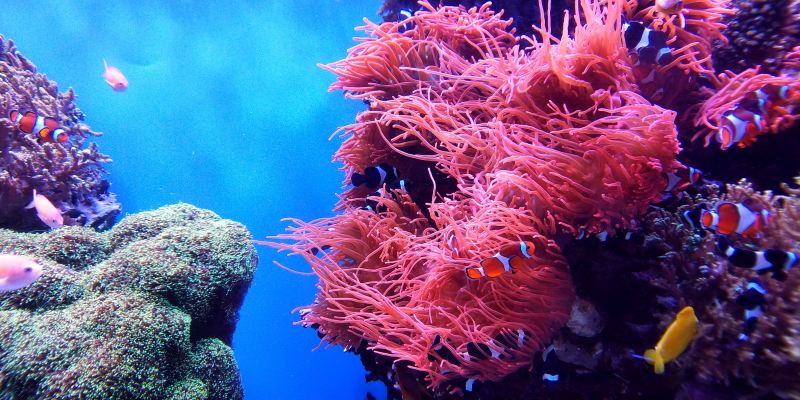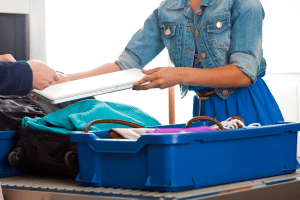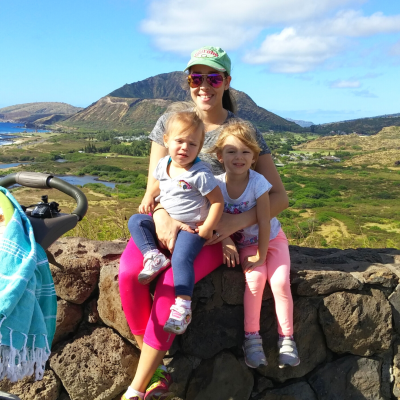Coral reefs play a very important role in keeping our oceans clean. Just like plants and trees keep our planet land alive and clean, so do coral reefs keep our oceans alive as well. Sadly over the years, the lifestyle that we live has caused a great damage to the coral reefs in our oceans. Today, June 1st, 2019, the first official day of National World Reef Day, I want to share with you some very important ways that you can protect our coral reefs no matter where you live at. World Reef Day was funded by Raw Elements in 2019.

Disclaimer: There are affiliate links in this post. To learn more about how affiliate links work please read our Disclosure Policy. Thank you for using our links and for your support.
ARE OUR CORAL REEFS REALLY SUFFERING?
According to Texas A&M University, Department of Oceanography, ten percent of the world’s reefs have been completely destroyed. In some places such as the Philippines, coral reefs have had the worse destruction ever at over 70% and only about 5% can be said to be in what is considered “good condition.”

HOW CAN I MAKE A DIFFERENCE?
I believe that ten percent of the world’s reefs is a big number. Very big number! Especially knowing how crucial these reefs are to our oceans and our planet. You can make a different though. Even if you feel like one person can’t make a difference, when we add up everyone that starts changing their lifestyle and pushing for taking care of our reefs, that number adds up. Eventually more and more people will be joining and spreading the word. Remember that it all starts with one person.
So here we go! Here are 11 things that you can do to protect our coral reefs.

1. PRACTICE SAFE AND RESPONSIBLE DIVING AND SNORKELING
When snorkeling, diving, or swimming, avoid any contact or touching any reefs. When the coral reefs are touched it will damage the delicate coral animals. Also be careful when moving around them as stirring up sediment can smother the corals. Believe it or not, coral reefs are alive and they are very delicate.
2. PRACTICE SAFE BOATING PROCEDURES
When anchoring your boat it is best to do so on a sandy bottom or use moorings away from coral reefs and sea grasses. Anchoring on the coral reefs can kill the corals and damage their delicate habitat by dragging on the corals. It can cause them to break and die out.

3. USE REEF SAFE SUN PROTECTION
This is a very great and simple approach that we all can take. I always aim to use an all natural and reef safe sunscreen when I go to the beach. It is good for our oceans and our bodies. Some of the ingredients that are put into sunscreens that aren’t reef safe can cause damage to our coral by bleaching them and even killing them. There are a few things that you can do to minimize the use of toxic chemicals in to the water. You can use a long-sleeved shirt, rash guards, reef safe sunscreen, and other natural options as well.
These are some reef-safe sunscreen options for you.
My favorite brand to use is Raw Elements. I have been using them for years since we lived in Hawaii. They have recently launched a zero waste baby and kids line as well which is perfect for my kids. There are some other brands as well that you can use listed below that are reef safe, non-toxic, and all natural.
** Use coupon code TWM10 for a 10% off your purchase at Raw Elements.**
Related Article: Beach Day Essentials

3. CHOOSE SUSTAINABLE SEAFOOD
Many places that sell seafood are not sustainably sourced. It is very important to make smart choices of the seafood that you choose to eat. You can learn how to make these choices at www.fishwatch.gov.
4. DON’T GIFT CORALS
It takes decades if not longer for corals to create reef structures. Don’t break them off. Please leave them on the reefs. Many tourist shops also damage these coral reefs for profit so always shop sustainably and consciously. The only way you can take home some coral is if you find it already washed up on the sand at shore. I have a few from several places I have visited that I have found washed up on shore while beach combing but never will I break a piece off of their delicate ecosystem.

5. CONSERVE WATER
Did you know that the wastewater runoffs eventually find their ways back into the oceans? Whether you leave near or far from the oceans, remember that all rivers and streams usually lead to the oceans one way or another. It is very important to conserve water by using less. Two to five minute showers, flushing your toilet less times during the day, and watching your water consumption can greatly help reduce the amount of wastewater heading back out in to our rivers and oceans. It also helps save you some money on that water bill if that helps to convince you. 😉
6. PROPERLY RECYCLE AND DISPOSE OF TRASH
It is important to know how to follow the three R’s: reduce, reuse, and recycle as well as how to properly dispose of your trash especially when visiting the beach. Always throw your trash away at home or in the proper bins. If the trashcans at the beaches are full, take it home with you to properly dispose of your waste. It is always important to follow the Leave No Trace Principles even at the beach, local parks, and even at home. If you smoke, never throw or leave behind any cigarette butts in the sand.
Marine debris and waste can greatly reduce the lifespan of our marine life and coral reefs by destroying them or causing severe damage to them. Remember that our coral reefs are a very delicate ecosystem.
Related Article: Leave No Trace – The Seven Principles

7. MINIMIZE USE OF CHEMICALS AND FERTILIZER.
Did you know that nutrients from excess fertilizer increases algae growth that blocks sunlight to our coral reefs? Just like any plants, our coral reefs need sun to live. Algae is a plant and fertilizers can help it grow abundantly blocking the sun that our coral reefs need to survive. We need a balance in these areas of our oceans.
Many other chemicals that you use can also cause harm. It is important to use detergents that are safe for our planet. Remember these end up in our wastewater which eventually end up in our rivers and oceans so it is important to watch the products that we use in our home as well.
8. SAVING ENERGY IS A BRIGHT IDEA
It is important for us to reduce our greenhouse gas emissions by using energy efficient light bulbs in our homes and work place. One of the leading threats to coral reef survival is climate change. If we look for ways to reduce our carbon footprint, we help reduce the climate change that is going on in our world.
A few things that you can do to save energy is turning off lights when you leave a room, turning off your electronic devices when they are not in use, opting to buying energy-efficient appliances (look for the Energy Star), and buy energy efficient light bulbs.
You can learn more about Energy Star-certified appliances here.
9. VOLUNTEER + BEACH CLEAN UPS
There are many ways that you can do your part as a volunteer. You can volunteer at beach cleanup events, reef clean up events, and even get involved in protecting your watershed. You can also pick up other peoples trash when you visit the beach. Always carry a bag and some gloves with you and do a quick beach cleanup on your way out.
10. CONSCIOUS AND SUSTAINABLE AQUARIUMS
If you choose to have a salt water aquarium, avoid buying living coral. When buying marine aquarium fish, make sure they were collected sustainably. It is important to purchase from brands that have our planet in mind.

11. SPREAD THE WORD!
One of the best ways to play your part and get more people on board on this mission is by spreading the word. Learn all you can about coral reefs and share it with your friends, family, schools, businesses, and even educate your local community. You can even set up your own beach or reef clean up (check your local community for guidelines) and spread the word there. Many people also form groups where they do a weekly or bi-weekly clean up and group events to help share the message about coral reef destruction in our oceans.
LET’S START PROTECTING OUR CORAL REEFS!
Well there it is. 11 ways that YOU can make a difference in our oceans. Do you already do any of these? Is there anything that you do that I didn’t mention? Would love to know how you are protecting our coral reefs. Let me know in the comments below.
If you enjoyed this article, feel free to sign up for our newsletter here so you can stay up to date on upcoming travel adventures, tips, gear reviews, recipes and more. Don’t forget to share or pin to save it. Thank you for reading.
RESOURCES
- United States Environment Protection Agency – What You Can Do To Help Protect Coral Reefs
- National Ocean Service – What Can I Do To Protect Coral Reefs?









